Clean Water State Revolving Fund Success Stories
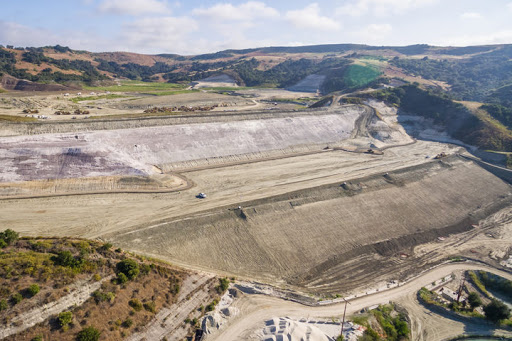
Total Cost: $111,663,515
Funding Sources: Prop 1 Grant: $15,000,000
CWSRF Drought Response 1% Financing Loan: $$96,663,515
Santa Margarita Water District completed construction of a new recycled water reservoir to provide seasonal storage for its existing recycled water system. Construction included converting an existing dam and reservoir to increase capacity and installing inlet/outlet pipelines and pumping facilities. Trampas Canyon Reservoir features three dams and is the largest surface water reservoir in south Orange County. Recycled water stored in Trampas Canyon Reservoir will irrigate parks, medians, and common area landscapes, offsetting potable water use. The potential water storage capacity is up to 5,000 ac-ft per year.
More information can be found at the following link: https://www.smwd.com/313/Trampas-Reservoir
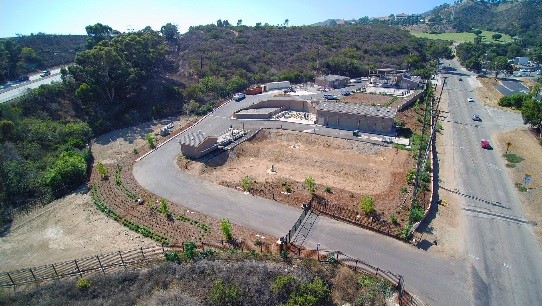
Total Project Cost: $60,292,000
Prop 1 Grant: $9,556,709
CWSRF Loan: $26,081,17
CWSRF Drought Response 1% Financing Loan: $24,654,121
The City of Malibu completed construction of a new centralized wastewater collection system, wastewater treatment facility, recycled water distribution system, and groundwater recharge wells as Phase 1 of a three-phase plan to replace existing septic systems and improve the water quality in the Civic Center and Malibu Lagoon areas. The collection system will convey 190,000 gpd to the newly constructed wastewater treatment facility where it will be treated to Title 22 unrestricted non-potable use standards. The recycled water will be used for irrigation of schools, parks, residential landscaping, and golf courses. Phase 1 will produce up to 70 million gallons (215 AF) of recycled water per year. Unused recycled water will be delivered to groundwater recharge wells.
More information can be found at the following link: https://www.youtube.com/watch?v=mvOQ-TCmJ-Q
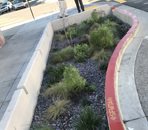
CWSRF Loan Amount: $7,435,000.00
The Project converted Holloway Avenue, an urban residential street, which is nearly 100% paved, into a greener, more pedestrian and bike friendly corridor by incorporating multi-functional green infrastructure technologies. Starting at Ashton Avenue extending just past Lee Avenue, corner bulbouts containing bioretention planters were installed. The vegetated bioretention planters captures, stores and infiltrates stormwater runoff from concrete sidewalks. Pervious concrete replaced the existing impervious asphalt/concrete pavement within the parking areas and directs roadway stormwater runoff into an underlying aggregate reservoir for storage and infiltration.
More information can be found at the following link: https://www.youtube.com/watch?v=ZFmsUTOMHoE
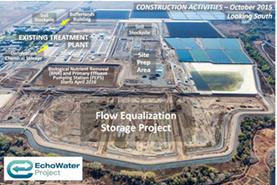
CWSRF Loan Amount: $1,576,978,261
The EchoWater Project is among the largest public works project in Sacramento’s history. When completed, it will keep Regional San in compliance with its regulatory permits and improve water quality by resulting in a nearly 95 percent reduction in ammonia discharged to the Sacramento-San Joaquin River Delta. It will also substantially increase water recycling opportunities (e.g., for agricultural irrigation, public landscapes, and industrial processes) by producing highly treated water that meets water reuse standards. The favorable loan terms will save ratepayers more than a half billion dollars in interest costs.
Read more about this project at http://www.regionalsan.com/echowater-project
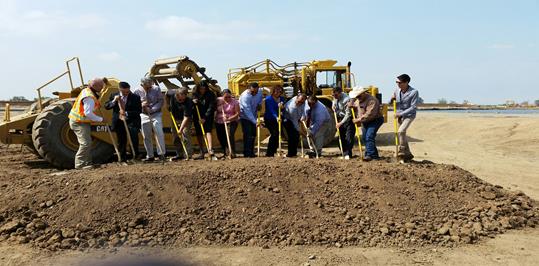
CWSRF Loan & Small Community Grant Amount: $8,064,825
This project, which is jointly funded between the State Water Board and USDA Rural Development, changes the WWTP disposal method from nearby Miles Creek to agricultural irrigation. This project will allow the District to comply with discharge requirements, improve water quality, and offset water that can be used for potable uses during this challenging drought. For this small, disadvantaged community, breaking ground is a big step as many challenges had to be overcome during the long planning process. It took many parties coming together and perseverance on the part of the Planada CSD Board and the community to reach this important milestone.
More information and a video of the ceremonies, can be found at the following link: http://abc30.com/news/turning-planadas-waste-into-farmers-water/677536/
No image available
CWSRF Loan & Small Community Grant Amount: $8,064,825
This project will provide better management of the treated effluent to the City's Land Application Areas as well as improve the operating reliability and efficiency of the existing WWTP and waste discharge area (WDA) facilities. This includes modifications to pumps, treatment, spray field distribution piping, and spray field equipment to improve treatment and disposal operations and minimize the potential for treated effluent runoff.
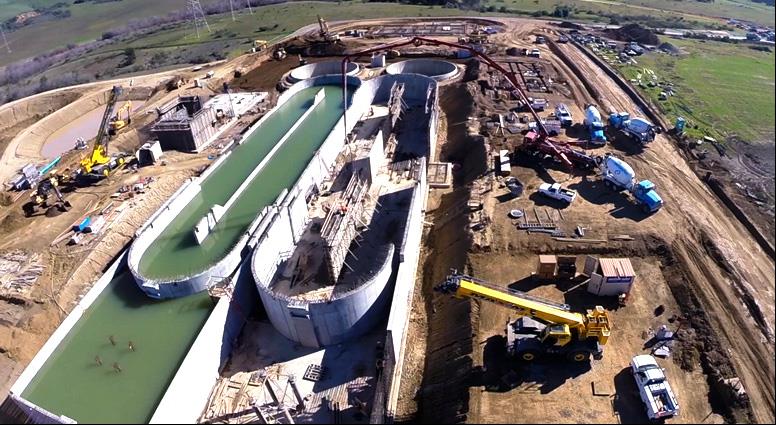
Water Recycling Grant Amount: $4,000,000
This project involves the construction of a wastewater collection system including pump stations with standby power facilities, a wastewater treatment plant, recycled water systems, and effluent disposal facilities. The collection system will provide sewer connections to about 4,800 properties in Los Osos. The work on the sewer entails building 49 miles of gravity sewers, force mains and recycled water pipelines, 21 pump stations, and eight acres of leach field. The primary purpose of this project is to offset freshwater use in the Basin with California Title 22 tertiary, filtered recycled water. Recycled water will be used for urban and agricultural irrigation at sites that currently rely on fresh water.


